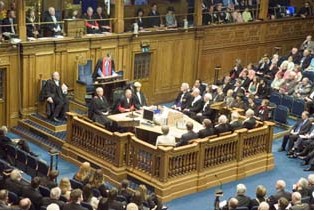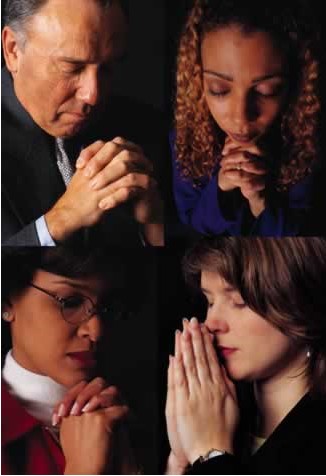 Related Articles
Related Articles
|
|
|
 Files
Files
|
|
|
|
|
Where to the presbyterian church in Scotland?
If the Church of Scotland splits, the nature of the problem changes; Watchman suggests that one 'solution' may just leave us with a new set of problems.
 In one of his philosophical and melancholy musings Woody Allen once drily observed: In one of his philosophical and melancholy musings Woody Allen once drily observed:
“More than any other time in history, mankind faces a crossroads. One path leads to despair and utter hopelessness. The other, to total extinction.
Let us pray we have the wisdom to choose correctly.”
In this piece of wry pessimism the American writer/actor/director seems to confine God’s intervention to that of assisting in the choice between the lesser of two evils. Let's trust that for the sake of the body of Christ in Scotland and the nation itself that the God we serve is bigger than that.
In terms of Scotland’s ecclesiastical history and present situation we stand, in April 2009, at an interesting moment. And in terms of Woody Allen’s alternatives there are two possible outcomes – for the Presbyterian churches in Scotland in general, and for the Church of Scotland in particular. Both of these could lead one to despair. (But while Mr Allen’s view may resonate within the present situation, don’t give up reading at this point.)
Next month the national Kirk is scheduled to meet in its annual General Assembly. And much attention – within and outwith the Church – will centre round a situation which will be presented before that large and important gathering of C of S leaders. The case in point is whether or not to ratify the ‘call’ by an Aberdeen congregation to a minister who is living with another man. The most recent background to all of this is that an objection – at Aberdeen Presbytery level – to this proposed appointment was remitted to a Committee of Assembly – a sub-set of the General Assembly itself. This committee, by the narrowest of votes, recently chose to place the matter before the forthcoming Assembly (the other options for the committee would have been to uphold or alternatively overturn the objection).
 So the General Assembly will be back where it found itself in 2006 on the issue of having to consider the Kirk’s position on human sexuality. Last time around the matter of how the handle civil partnerships (aka same-sex marriage) was passed back to local churches via a mechanism called the Barrier Act – a vital though cumbersome safeguard to prevent the Assembly taking important decisions without first consulting local congregations. And we could be back here again in May. So the General Assembly will be back where it found itself in 2006 on the issue of having to consider the Kirk’s position on human sexuality. Last time around the matter of how the handle civil partnerships (aka same-sex marriage) was passed back to local churches via a mechanism called the Barrier Act – a vital though cumbersome safeguard to prevent the Assembly taking important decisions without first consulting local congregations. And we could be back here again in May.
However, tensions within the Church of Scotland are now higher, much higher; and there are two likely scenarios – both of which hardly bear contemplation.
Scenario No. 1 – the Church of Scotland stays together; a problem –
Unity where there should be division
The first scenario is the one described above, whereby the whole process is fed back into the great big machine, and Scotland is left – yet again – without any clear direction on a matter of great importance and spiritual significance in the life of our nation and its people. While the national church in its divided and indecisive condition continues to enjoy no credibility whatsoever in the eyes of its members and the general public at large.
Alternatively, the frustrations being experienced on both sides of the present issue will result in the Church of Scotland – probably later than immediately; and in a 'managed process' – splitting in two. But of itself, this would not be a disaster: the fact is the Church is already split down the middle. (And the narrowness of the above-mentioned vote bears this out.) So an actual split would bring appearances into line with reality. And it would (hopefully) re-establish Truth above the present superficial (read hypocritical) unity. The real disaster is what might start to unfold following May’s Assembly if ‘back-channel’ discussions gather momentum with a view to a (near-future) re-ordering of the denominations.
Scenario No. 2 – the Church of Scotland splits; a problem –
Division where there should be unity
 When children fall out in the playground, they distance themselves from their erstwhile friends and very quickly seek out others to play with – others with whom they empathise. Denominations tend to behave in similar fashion. But whether in schoolyard or nation, a problem remains. It may not be much mentioned, but everyone knows its there. When children fall out in the playground, they distance themselves from their erstwhile friends and very quickly seek out others to play with – others with whom they empathise. Denominations tend to behave in similar fashion. But whether in schoolyard or nation, a problem remains. It may not be much mentioned, but everyone knows its there.
The ‘elephant in the room’ is the fact that previous relational ruptures remain unresolved. (See chart) So a great danger amidst any up-beat ecclesiastical jargon of realignment that might ensue is that earlier breaches in the presbyterian evangelical camp are not addressed. And, to employ the playground metaphor, some children who should be amongst the rest of the evangelical playgroup are left in the corner of the ecclesiastical schoolyard.
Accordingly a major issue were a new denomination to emerge is the need to first repair splits with others who share the same biblical persuasions. The word of God says:
"Therefore, if you are offering your gift at the altar and there remember that your brother has something against you, leave your gift there in front of the altar. First go and be reconciled to your brother; then come and offer your gift." (Matt 5:23-24).
And we can be sure He doesn't apply this to just some of the relationships within the body of Christ.
A paraphrase might go something like this: “Get ALL your relationships within evangelical presbyterianism sorted out and restored before God can truly bless any new set-up".
A ‘brown field’ site needs to be cleared of all of yesterday’s rubble before laying foundations for a new build.
And in it all, a Misplaced Trust
If a merger – of any dimension – were to take place what could ensue would no doubt be promoted as a (new) reinvigorated ‘Bible-believing’ denomination. Whilst this might sound an attractive proposition it could create yet another (spiritual) problem.
 Bullish groupings in the secular world tend to place their confidence in their own strengths; and this is diametrically opposite to trusting in God. Denominations can very easily fall into exactly the same trap. Bullish groupings in the secular world tend to place their confidence in their own strengths; and this is diametrically opposite to trusting in God. Denominations can very easily fall into exactly the same trap.
God honed down Gideon’s group before He used them so that He would get the glory. (Judges 7:2) And in so doing they were obliged to rely on His tactics and not their own. (Judges 7:13-15)
King David invoked God’s anger when he did a head count of his troops. (2 Samuel 24:10).
Re-organisation; re-organisation; re-organisation
Additionally, organisations are institutional in their ways – denominations included – and, when problems arise, those who lead them tend to produce institutionalised responses.
"We trained hard, but it seemed that every time we were beginning to form up into teams we would be re-organised. I was to learn in life that we tend to meet any new situation by re-organisation, and a wonderful method it can be for creating the illusion of progress while producing confusion, inefficiecy and demoralisation."
Petronius Arbitor - Governor of Bithnia (Roman Empire) (Committed suicide A.D. 65)
God’s strength is in our weakness, so our place is at the foot of the cross not trusting in a mighty new denomination. (Zechariah 4:6) Political and bureaucratic manoeuvring are the world’s ways, and these have brought the Church of Scotland - but not just the Church of Scotland - to this pretty pass. But this is not the way of the Holy Spirit and should not be the way of Christ’s church. (Apart from that,estabishing or re-ordering structures and bureacratic machinery is an immense distraction and deflection of effort from the work of taking Christ to a nation that needs to hear of a Saviour.)
The Third Way: God’s way
In a summary analysis of Woody Allen’s worldview, both roads lead to despair. In our case one road leads to the Church of Scotland staying together in superficial and dishonest union. (cf Amos 3:3) A likely alternative is a(n eventual) split which produces a new man-made alliance of some evangelical churches within the presbyterian scene; believing all the while that this would be the answer to it all.
But, in contrast to Woody Allen’s rather bleak outlook, there is a third option. And that is God.
 At this critical time, when we see our nation and a world in turmoil, with lives in ruin and new legislation taking us ever-further from the ways of God, that by His grace we find a new humility to turn from our clever ways of organising (and re-organising) our tribal groupings (Isaiah 55:8-9). And to call upon Him to do – in our midst and in our land – what He wants, in His way. At this critical time, when we see our nation and a world in turmoil, with lives in ruin and new legislation taking us ever-further from the ways of God, that by His grace we find a new humility to turn from our clever ways of organising (and re-organising) our tribal groupings (Isaiah 55:8-9). And to call upon Him to do – in our midst and in our land – what He wants, in His way.
What we need in our land – and history bears this out – is not so much an expedient alliance to form another (new) church (cf Jeremiah 2:13) but an outpouring of the Holy Spirit onto a dry and parched land in response to a church on its knees in weakness, not (human) strength.
We need a church in utter dependency on God rather than denominational realignments.
And here’s the rub; that too needs a work of God to accomplish. (Zech 12:10a) We need to pray. God help us, for the sake of Scotland (Jeremiah18:8) and supremely for His glory. (Ezekiel 36:22).
Ed Footnotes:
In the 1980s a union between the Church of Scotland and the Scottish Episcopal Church was attempted. Negotiations for the proposed union were almost completed, and were ratified by the General Assembly, but were voted down by the Church of Scotland's presbyteries when referred to them under the Barrier Acts.
In the 1990s, the Scottish Churches Initiative for Union (SCIFU) aimed to unite the Church of Scotland, Scottish Episcopal Church, the Methodist Church (in Scotland) and the United Reformed Church (in Scotland) by 2010. After considerable debate, the SCIFU proposals were rejected by the General Assembly of the Church of Scotland in May 2003.
At the time of the last major split in the Church of Scotland in 1843 (the 'Disruption'), those evangelicals who left (to establish something new) were matched by those evangelical who stayed (to try and bring reform from within).
The history of successive splits and subsequent ecclesiastical joinery through the centuries in the presbyterian church(es) is not a pretty picture; and has got nothing to do with that true unity of spirit for which Jesus prayed (John 17:20-21). Denominational alliances mean nothing if neighbouring evangelical churches in the same village, town or city are not in fellowship with one another.
Pray that the wisdom of God and not man will prevail in these matters.
See here for a brief history and a roadmap of Scottish presbyterianism (16th - 21st century)
|
Watchman, 25/04/2009
|
|
|
|